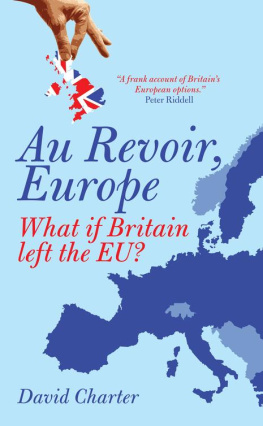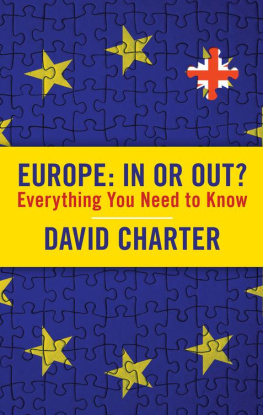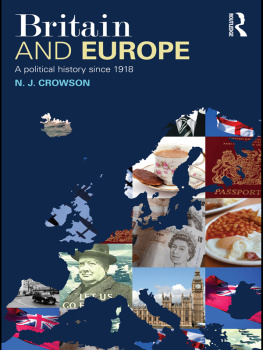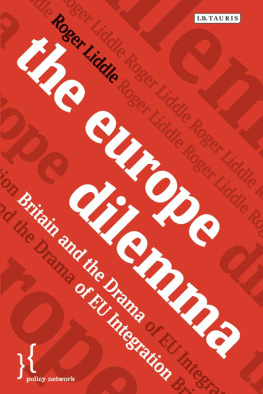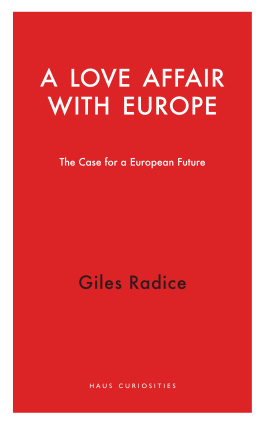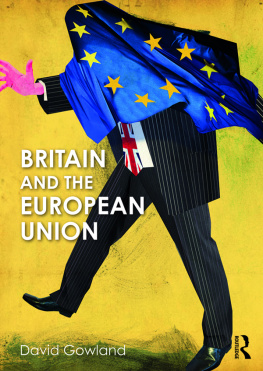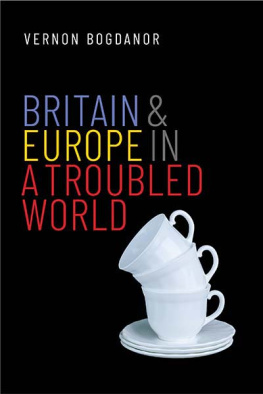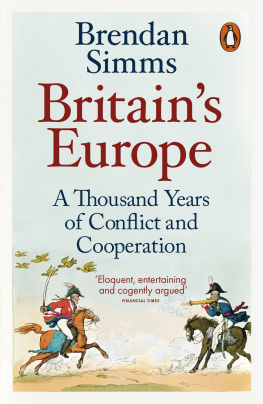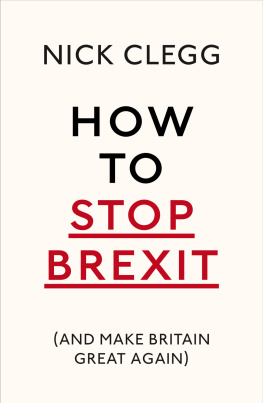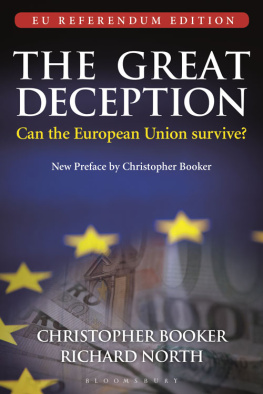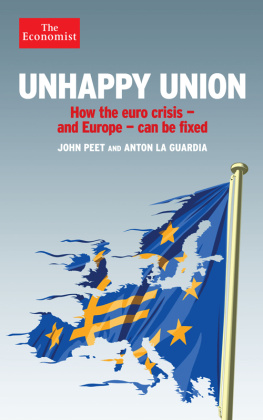W hen Iain Dale proposed a book on Britains fraught forty-year relationship with the European Union, it fitted in perfectly with my own plans to write a Brussels valediction after spending five years working there for The Times. I would like to thank Iain for the opportunity to write the story of Britains detachment from the EU and Hollie Teague at Biteback for her judicious editing.
I am grateful to James Harding, editor of The Times, Robert Thomson, former editor, and Richard Beeston, foreign editor, for providing me with the opportunity to spend so much time with the European Union, and my other colleagues in The Times foreign news department for their support.
I have many other people to thank for their kind assistance with this book, including: Dennis Abbott, Eva Baumann, Pervenche Bers MEP, Stephen Booth, Elmar Brok MEP, Anthony Browne, Martin Callanan MEP, Brent Cameron, David Campbell Bannerman MEP, Richard Corbett, Neil Corlett, Chris Cummings, Andrew Duff MEP, Senator Alan Eggleston, George Eustice MP, Nigel Farage MEP, Patrizio Fiorilli, Chris Fretwell, Phil Goff MP, Antony Gravili, Mark Gray, Chris Heaton-Harris MP, Tom Hind, James Holtum, Baron Howard of Lympne, Syed Kamall MEP, Sony Kapoor, Mohan Kaul, Helen Kearns, Maja Kocijancic, Philippe Legrain, Edward McMillan-Scott MEP, Denis MacShane MP, Paul Moore, Mats Persson, David Poyser, Konrad Schiemann, Fredrik Sejersted, Eleanor Sharpston, Ransford Smith, Martin Sorrell, Philip Souta, Struan Stevenson MEP, Ulf Sverdrup, Jonathan Todd, Gawain Towler, Marjory Van Den Broeke, Ton Van Lierop, Guy Verhofstadt MEP, Roger Waite, Simon Walker, Baroness Williams of Crosby, and those who talked to me off the record, as well as my brilliant Brussels colleagues Stephen Castle, Geoff Meade, Ian Traynor, Bruno Waterfield and the incomparable Jacki Davis for her generous advice.
Special thanks are due to Stephen Cave for wise words and numerous suggestions of improvements. Needless to say, all mistakes, omissions and misunderstandings are mine. Last, but not least, I am eternally grateful to my family and especially to Michelle for making it all possible.
Berlin, October 2012.
Common Agricultural Policy (CAP) An EU system of subsidies for farmers.
Council of the European Union Forum for national ministers to meet and take policy and legislative decisions.
Economic and Monetary Union (EMU) The system underpinning the single currency.
Enlargement Policy of expanding the EU to include more countries.
Euro The European single currency shared by seventeen nations.
European Central Bank (ECB) Administers monetary policy for the seventeen countries in the single currency.
European Commission Executive body of the European Union, responsible for administration, oversight and proposing legislation.
European Commissioner Member of the European Commission cabinet (known as the college, comprising one representative from each of the twenty-seven EU member states).
European Council EU institution where leaders from the member states meet to set policy.
European Court of Human Rights (ECHR) Court in Strasbourg that upholds the European Convention on Human Rights. It is not part of the European Union.
European Court of Justice (ECJ) Court based in Luxembourg that upholds and interprets EU law, comprising one judge from each member state.
European Economic Area (EEA) Thirty countries (EU plus Iceland, Liechtenstein and Norway) that take part in the single market and adopt all relevant EU laws.
European Economic Community (EEC) Former name of the EU, which changed under the Maastricht Treaty of 1993.
European External Action Service (EEAS) Diplomatic corps and overseas representation of the EU.
European Free Trade Association (EFTA) Four-country group (Iceland, Liechtenstein, Norway and Switzerland) originally set up with more countries, including the UK, in 1960 as an alternative to the EEC.
European Parliament Elected legislative body of the EU, composed of 754 Members of the European Parliament (MEPs) including seventy-three from the UK.
European Union (EU) Economic and political alliance of twenty-seven nations synonymous with its main location in Brussels and built upon a series of treaties starting with the Treaty of Rome in 1957.
Four freedoms The basis of the single market: the free movement of capital, goods, people and services.
Multi-annual financial framework Seven-year EU budget programme.
Qualified majority voting (QMV) Method of deciding matters between ministers in the Council of the EU that attaches extra weight to bigger countries in a complicated formula.
Schengen Name taken from a border town in Luxembourg for the common visa-free travel zone in continental Europe joined by twenty-six countries.
Single market EU internal tariff-free trading area established by the Single European Act of 1986.
Structural funds EU system of internal aid for infrastructure projects in poorer areas.
And finally, the United Kingdom
A parade of Prime Ministers and Presidents from twenty-six European nations had signed the Lisbon Treaty. Each country was represented by its leader and Foreign Secretary at the grand ceremony staged in the magnificent sixteenth-century Jernimos Monastery in the Portuguese capital. For France, the trio of President, Prime Minister and Foreign Minister all gathered at the podium to autograph the European Unions latest set of rule changes and then congratulate each other. When the turn of the twenty-seventh and final EU member ( alphabetically ) was announced, David Miliband, the Foreign Secretary, approached the signing table. He was alone. Instead of celebrating with his Prime Minister after the historic moment of signature, Miliband shook hands with the usher who handed him the pen. The commemorative photo of smiling leaders taken in front of the monastery in the sunshine shortly afterwards shows Miliband standing rather sheepishly at the end of the back row, grinning like a naughty schoolboy.
Gordon Brown stayed behind in London that morning to attend a routine session of the House of Commons Liaison Committee and then, ludicrously, jumped on a plane to Lisbon. He arrived more than three hours late while everyone else was finishing a sumptuous banquet lunch at the National Coach Museum. It was here, in front of a display of gilded carriages which once carried papal envoys and Portuguese kings, that the British Prime Minister filled in the gap left for his name on the treaty.
The manner of the signing of the Lisbon Treaty spoke volumes about Britains relationship with the EU. It was awkward, it was half-hearted and it was late. It seemed to symbolise the way that, while special treatment is often demanded by the British, Europe rarely receives our full attention. Of course, if they had really wanted to, Downing Street could have rescheduled Browns appearance at the committee of MPs, which was announced some time after the date was set for the grandiose European gathering. Perhaps it was intended to convey a proper focus on domestic affairs during Europes hour of self-congratulation, perhaps it was a genuine attempt to keep everyone happy, but in the event the Prime Ministers performance pleased no one, not the eurosceptics who wanted a referendum and the chance to reject the document, nor the europhiles who hoped to see Britain playing a more central role in Europe. It was a gift to the newspaper sketch-writers the backroom deal, the bungled snub, the very British embarrassment.
Fast forward four years almost to the day and the British Prime Minister was once again standing alone. David Cameron ensured that he would not have to face any lavish signing ceremony for the Fiscal Compact, a German-inspired set of new rules for national budgets, by the simple expedient of using his veto to prevent it from becoming a fully fledged EU treaty. Back in Britain, Camerons gesture was hailed as a triumph by his backbenchers and rewarded with a leap in support for the Conservatives in the opinion polls. It was a surge that lasted all of three weeks. He and George Osborne, the Chancellor of the Exchequer, then spent the next year telling the eurozone countries to hurry up and get on with their integrationist reforms to save the struggling single currency, which by this time was having a serious impact on Britains economic prospects. The veto had prevented an EU treaty, from which the UK would have been granted an opt-out, cheered British eurosceptics and annoyed almost every political leader in Europe, twenty-five of whom went ahead anyway with their new rules in an intergovernmental agreement.

